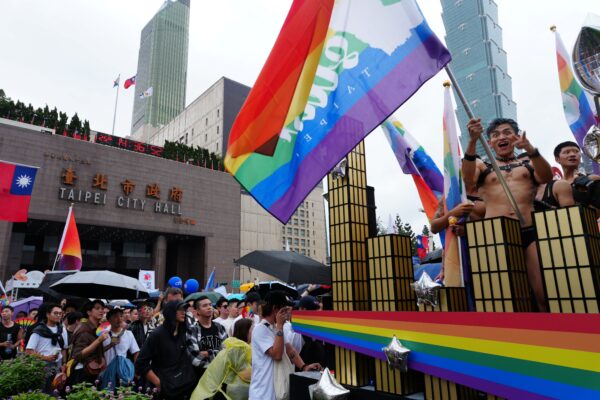Just weeks after Hong Kong's Legislative Council voted down a proposal to recognize same-sex partnerships, LGBTQ advocate Jimmy Sham walked through Taipei's rainy streets in a black rainbow T-shirt on Saturday, joining tens of thousands at Asia's largest Pride parade. Nearly 150,000 people braved the rain to celebrate Pride in the first Asian city to legalize same-sex marriage, including almost 180 NGOs, political parties, international organizations, and gender-friendly companies, according to parade organizers. Drag queens in sparkling sequined gowns and revelers in vibrant rainbow costumes filled the streets with an explosion of color, painting Taipei’s rain-soaked streets with joy and defiance. This year’s parade began at Citizen's Plaza before splitting into two routes that looped through the East District and returned to City Hall. I'm envious of Taiwan, Sham said, watching government booths line Taipei's streets. You can see the Taipei city government and all the government departments setting up booths. In Taiwan, all the political parties show they care about the gay community. The contrast between the two places couldn't be starker. As Taiwan marks its sixth year of marriage equality, Hong Kong's LGBTQ community grapples with a significant legal defeat that has left same-sex couples without any formal recognition. [caption id=attachment_297962 align=aligncenter width=6000] Hong Kong LGBTQ activist Jimmy Sham attended the Taiwan Pride Parade after being released from prison over a national security case. Photo by Kelly Yu.[/caption] A Legislative Setback In September, Hong Kong’s “patriots only” legislature rejected a proposal to create a registration system for same-sex couples, denying them rights to medical decisions and end-of-life arrangements. The veto, the first since Beijing’s 2020 National Security Law and 2021 electoral reform reshaped the Legislative Council, cited traditional family values, reflecting China’s tightening grip on the semi-autonomous city. The rejected bill stemmed directly from Sham's long-running legal battle. After marrying his husband in New York in 2013, Sham sought official recognition of their relationship in 2018. While the Court of Final Appeal rejected his bid in 2023, it ordered the government to create an alternative framework within two years. The deadline was October 27, 2025. Sham, freed in May after four years in prison over the city’s biggest national security case, called the defeat “expected but disappointing.” The pro-democracy activist said this is a “constitutional responsibility” the government must fulfill, adding that officials should at least take administrative measures to protect same-sex couples' rights. “While these measures cannot replace the constitutional responsibility, what can be done should be done first. After all, this is a consensus by all political parties in Hong Kong,” he said. Two Worlds, One Strait Apart The divergence between Hong Kong and Taiwan extends beyond legal frameworks to public expression itself. Hong Kong last held a physical Pride parade in 2018. Since then, the event has shrunk to smaller rallies, virtual broadcasts, or indoor markets. Pink Dot, the city's largest LGBTQ event, moved online this year after losing its usual venue at the West Kowloon Cultural District. It will instead take the form of a virtual concert on November 2. Sham, who was the spokesperson of the 2018 Hong Kong Pride parade, responded with a bitter laugh when asked to compare the two places: “You can't compare them. Hong Kong has no parade. It's like comparing an orange with an apple. There's nothing to compare.” For Hong Kong YouTuber Matthew, the difference between the two places is deeply personal. He moved to Taiwan last year after marrying his Taiwanese husband, Henry, leaving behind a high-paying job and his social circle in Hong Kong. It feels like two different worlds, he said. Taiwan has already legalized same-sex marriage. I'm braver about being myself – whether on the street, at work, or in other places. But in Hong Kong I hide myself more. Even now when I go back to Hong Kong, there are many things – like holding hands – that I still don't dare to do. Henry, who attended the parade with Matthew, reflected on how marriage equality has changed their lives together. This is a pretty important motivation for us to maintain our relationship – that we have a future. It's not like being together with no future ahead, he said. He expressed sympathy for same-sex couples in Hong Kong who continue to face an uncertain future without legal recognition. Of course everyone hopes to legally marry, Henry said. Just don't give up. Keep working hard, and there will definitely be opportunities. [caption id=attachment_297961 align=aligncenter width=6000] Hong Kong YouTuber Matthew (right) moved to Taiwan last year after marrying his Taiwanese husband Henry (left). Photo by Kelly Yu.[/caption] Taiwan’s Hard Won Progress Under this year’s theme, Beyond Links: More than Clicks, the parade held by the Taiwan Rainbow Civil Action Association aims to address discrimination against the rainbow community in the age of social media. Speaking to reporters before the event, the association's chairperson Simon Tai expressed regret about Hong Kong's situation but drew parallels with Taiwan’s own arduous path. It's hard to compare how fast different places make progress on rights, he said. Hong Kong's LGBTQ community is facing setbacks now, but Taiwan went through similar challenges in the past. We believe society moves forward when people keep talking about these issues and working together to find common ground. Taiwan's path to legalize same-sex marriage wasn't smooth. Early proposals in 2006 faced immediate rejection, and the marriage equality referendum process sparked contentious public debates. Tai emphasized that history is not linear, adding that rights movements in various countries often take “three steps forward, two steps back.” [caption id=attachment_297963 align=aligncenter width=6000] This year’s parade aims to address discrimination against the rainbow community in the digital age. Photo by Kelly Yu.[/caption] Shing, an advocacy officer with the co-organizing Taiwan LGBTQ Family Rights Advocacy, told The Diplomat that social change requires both legal reform and public education. Sometimes the government says we need to reach social consensus, but social consensus also needs institutions to be established first, Shing said. Gradually, people understand that these institutional changes won't actually cause negative social impacts. Taiwan's experience bears this out. Shing said that attitudes have shifted notably over the six years since marriage equality was legalized – once legal systems are in place, people gradually become accustomed to them. Louis Lee from the Hong Kong media outlet G Dot TV brought friends to his fifth Taiwan Pride because many had never experienced the city's diminished Pride events. We wanted them to feel Taiwan's atmosphere and see if there are experiences we can bring back, he said. When asked what lessons Taiwan's experience offers Hong Kong, Lee pointed to perseverance. Taiwan waited many years to achieve marriage equality and gender education through many struggles, he said. The most important thing is to keep fighting. For Hong Kong's embattled LGBTQ community, Shing offered words of encouragement: Changes won't happen overnight, but through education and sharing life stories, the future will get better. We're planting seeds now that will grow into what we hope for,” she said. [caption id=attachment_297959 align=aligncenter width=6000] Taiwan LGBTQ Family Rights Advocacy says social change requires both legal reform and public education. Photo by Kelly Yu.[/caption] Seeds for the Future After the legislative defeat, Amnesty International Hong Kong Overseas launched a petition urging the government to propose a new framework for same-sex partnerships and anti-discrimination laws. It has attracted more than 9,200 signatures worldwide as of October 20. “We hope to gather attention and support from around the world for equal rights for same-sex couples in Hong Kong, demonstrating international solidarity,” the organization told The Diplomat, pledging to monitor the government’s response to the October 27 court deadline. E-Ling Chiu, National Director of Amnesty International Taiwan, emphasized collaboration with Hong Kong colleagues. We share some commonalities and similarities in terms of language and culture, she told the Diplomat during the parade. So of course we also hope that the Taiwan branch can play more of a role in assisting Amnesty International Hong Kong Overseas to carry out these advocacy actions. Chiu added that the two branches have been working together on Pride events and human rights education to address challenges faced by the Hong Kong diaspora community. [caption id=attachment_297964 align=aligncenter width=6000] Amnesty International Taiwan National Director E-Ling Chiu hopes more Asia-pacific regions will embrace marriage equality. Photo by Kelly Yu.[/caption] Following Taiwan’s lead, Thailand and Nepal have legalized same-sex marriage, while Japan offers limited partnership systems. Chiu hopes these steps signal a growing wave of inclusion across the Asia-Pacific. As the rain cleared and rainbows filled Taipei’s streets, Sham marched forward, carrying the hope that one day Hong Kong’s skies might shine just as brightly. I'm still alive, so I have to keep going. The sun won't stop just because I'm unhappy, so I have to keep going, he said.
Rain and Rainbows: Taiwan Celebrates Pride as Hong Kong’s LGBTQ Rights Stall
Just weeks after Hong Kong's Legislative Council voted down a proposal to recognize same-sex partnerships, LGBTQ advocate Jimmy Sham walked through Taipei's rainy streets in a black rainbow T-shirt on Saturday, joining tens of thousands at Asia's largest Pride parade. Nearly 150,000 people braved the rain to celebrate Pride in the first Asian city to legalize same-sex marriage, including almost 180 NGOs, political parties, international organizations, and gender-friendly companies, according to parade organizers. Drag queens in sparkling sequined gowns and revelers in vibrant rainbow costumes filled the streets with an explosion of color, painting Taipei’s rain-soaked streets with joy and defiance. This year’s parade began at Citizen's Plaza before splitting into two routes that looped through the East District and returned to City Hall. I'm envious of Taiwan, Sham said, watching government booths line Taipei's streets. You can see the Taipei city government and all the government departments setting up booths. In Taiwan, all the political parties show they care about the gay community. The contrast between the two places couldn't be starker. As Taiwan marks its sixth year of marriage equality, Hong Kong's LGBTQ community grapples with a significant legal defeat that has left same-sex couples without any formal recognition. [caption id=attachment_297962 align=aligncenter width=6000] Hong Kong LGBTQ activist Jimmy Sham attended the Taiwan Pride Parade after being released from prison over a national security case. Photo by Kelly Yu.[/caption] A Legislative Setback In September, Hong Kong’s “patriots only” legislature rejected a proposal to create a registration system for same-sex couples, denying them rights to medical decisions and end-of-life arrangements. The veto, the first since Beijing’s 2020 National Security Law and 2021 electoral reform reshaped the Legislative Council, cited traditional family values, reflecting China’s tightening grip on the semi-autonomous city. The rejected bill stemmed directly from Sham's long-running legal battle. After marrying his husband in New York in 2013, Sham sought official recognition of their relationship in 2018. While the Court of Final Appeal rejected his bid in 2023, it ordered the government to create an alternative framework within two years. The deadline was October 27, 2025. Sham, freed in May after four years in prison over the city’s biggest national security case, called the defeat “expected but disappointing.” The pro-democracy activist said this is a “constitutional responsibility” the government must fulfill, adding that officials should at least take administrative measures to protect same-sex couples' rights. “While these measures cannot replace the constitutional responsibility, what can be done should be done first. After all, this is a consensus by all political parties in Hong Kong,” he said. Two Worlds, One Strait Apart The divergence between Hong Kong and Taiwan extends beyond legal frameworks to public expression itself. Hong Kong last held a physical Pride parade in 2018. Since then, the event has shrunk to smaller rallies, virtual broadcasts, or indoor markets. Pink Dot, the city's largest LGBTQ event, moved online this year after losing its usual venue at the West Kowloon Cultural District. It will instead take the form of a virtual concert on November 2. Sham, who was the spokesperson of the 2018 Hong Kong Pride parade, responded with a bitter laugh when asked to compare the two places: “You can't compare them. Hong Kong has no parade. It's like comparing an orange with an apple. There's nothing to compare.” For Hong Kong YouTuber Matthew, the difference between the two places is deeply personal. He moved to Taiwan last year after marrying his Taiwanese husband, Henry, leaving behind a high-paying job and his social circle in Hong Kong. It feels like two different worlds, he said. Taiwan has already legalized same-sex marriage. I'm braver about being myself – whether on the street, at work, or in other places. But in Hong Kong I hide myself more. Even now when I go back to Hong Kong, there are many things – like holding hands – that I still don't dare to do. Henry, who attended the parade with Matthew, reflected on how marriage equality has changed their lives together. This is a pretty important motivation for us to maintain our relationship – that we have a future. It's not like being together with no future ahead, he said. He expressed sympathy for same-sex couples in Hong Kong who continue to face an uncertain future without legal recognition. Of course everyone hopes to legally marry, Henry said. Just don't give up. Keep working hard, and there will definitely be opportunities. [caption id=attachment_297961 align=aligncenter width=6000] Hong Kong YouTuber Matthew (right) moved to Taiwan last year after marrying his Taiwanese husband Henry (left). Photo by Kelly Yu.[/caption] Taiwan’s Hard Won Progress Under this year’s theme, Beyond Links: More than Clicks, the parade held by the Taiwan Rainbow Civil Action Association aims to address discrimination against the rainbow community in the age of social media. Speaking to reporters before the event, the association's chairperson Simon Tai expressed regret about Hong Kong's situation but drew parallels with Taiwan’s own arduous path. It's hard to compare how fast different places make progress on rights, he said. Hong Kong's LGBTQ community is facing setbacks now, but Taiwan went through similar challenges in the past. We believe society moves forward when people keep talking about these issues and working together to find common ground. Taiwan's path to legalize same-sex marriage wasn't smooth. Early proposals in 2006 faced immediate rejection, and the marriage equality referendum process sparked contentious public debates. Tai emphasized that history is not linear, adding that rights movements in various countries often take “three steps forward, two steps back.” [caption id=attachment_297963 align=aligncenter width=6000] This year’s parade aims to address discrimination against the rainbow community in the digital age. Photo by Kelly Yu.[/caption] Shing, an advocacy officer with the co-organizing Taiwan LGBTQ Family Rights Advocacy, told The Diplomat that social change requires both legal reform and public education. Sometimes the government says we need to reach social consensus, but social consensus also needs institutions to be established first, Shing said. Gradually, people understand that these institutional changes won't actually cause negative social impacts. Taiwan's experience bears this out. Shing said that attitudes have shifted notably over the six years since marriage equality was legalized – once legal systems are in place, people gradually become accustomed to them. Louis Lee from the Hong Kong media outlet G Dot TV brought friends to his fifth Taiwan Pride because many had never experienced the city's diminished Pride events. We wanted them to feel Taiwan's atmosphere and see if there are experiences we can bring back, he said. When asked what lessons Taiwan's experience offers Hong Kong, Lee pointed to perseverance. Taiwan waited many years to achieve marriage equality and gender education through many struggles, he said. The most important thing is to keep fighting. For Hong Kong's embattled LGBTQ community, Shing offered words of encouragement: Changes won't happen overnight, but through education and sharing life stories, the future will get better. We're planting seeds now that will grow into what we hope for,” she said. [caption id=attachment_297959 align=aligncenter width=6000] Taiwan LGBTQ Family Rights Advocacy says social change requires both legal reform and public education. Photo by Kelly Yu.[/caption] Seeds for the Future After the legislative defeat, Amnesty International Hong Kong Overseas launched a petition urging the government to propose a new framework for same-sex partnerships and anti-discrimination laws. It has attracted more than 9,200 signatures worldwide as of October 20. “We hope to gather attention and support from around the world for equal rights for same-sex couples in Hong Kong, demonstrating international solidarity,” the organization told The Diplomat, pledging to monitor the government’s response to the October 27 court deadline. E-Ling Chiu, National Director of Amnesty International Taiwan, emphasized collaboration with Hong Kong colleagues. We share some commonalities and similarities in terms of language and culture, she told the Diplomat during the parade. So of course we also hope that the Taiwan branch can play more of a role in assisting Amnesty International Hong Kong Overseas to carry out these advocacy actions. Chiu added that the two branches have been working together on Pride events and human rights education to address challenges faced by the Hong Kong diaspora community. [caption id=attachment_297964 align=aligncenter width=6000] Amnesty International Taiwan National Director E-Ling Chiu hopes more Asia-pacific regions will embrace marriage equality. Photo by Kelly Yu.[/caption] Following Taiwan’s lead, Thailand and Nepal have legalized same-sex marriage, while Japan offers limited partnership systems. Chiu hopes these steps signal a growing wave of inclusion across the Asia-Pacific. As the rain cleared and rainbows filled Taipei’s streets, Sham marched forward, carrying the hope that one day Hong Kong’s skies might shine just as brightly. I'm still alive, so I have to keep going. The sun won't stop just because I'm unhappy, so I have to keep going, he said.




